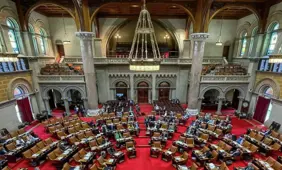EGBA Challenges Austria’s Outdated Gambling Model
Austria is under growing pressure from the European Gaming and Betting Association (EGBA) to modernize its outdated gambling laws.

Austria pinned on map. EGBA urges Austria to end gambling monopoly.
As one of only two European Union countries—alongside Poland—still clinging to a state-run gambling monopoly, Austria faces criticism for failing to meet modern industry standards. The EGBA has pointed to the rise of unregulated offshore gambling as a glaring flaw in the current system, highlighting the urgent need for reform.
A Booming Black Market
EGBA has flagged Austria’s thriving black market as evidence of the system's inefficiency. With many Austrian gamblers turning to offshore websites, the government loses out on significant tax revenue while leaving consumers unprotected. Offshore operators bypass local regulations and consumer safeguards, exposing players to potential risks. EGBA estimates that transitioning to a multi-licensing model could generate up to €1 billion in additional tax revenue by 2030, a figure that underscores the economic potential of reform.
EGBA is urging Austrian leaders, including Chancellor Karl Nehammer, Andreas Babler, and Beate Meinl-Reisinger, to seize the opportunity presented by ongoing coalition negotiations to update the country’s gambling regulation and laws. The group has pointed to successful reforms in other EU nations, such as Denmark and Sweden, as examples to follow. Denmark’s adoption of a multi-licensing system in 2012 increased the regulated portion of its online gambling market from 72% to 90% within a decade. These reforms have been praised for improving consumer protections, strengthening regulatory oversight, and boosting tax revenues.
Benefits of a Multi-Licensing System
The EGBA argues that a multi-licensing framework would provide Austria with several key advantages. By regulating a larger portion of the gambling market, authorities could implement stronger consumer protection measures, such as gambling self-exclusion tools and stricter advertising rules. Additionally, the establishment of an independent regulatory body could enhance market oversight and ensure compliance with updated regulations.
A revamped tax system based on gross gaming revenue could also make it easier for licensed operators to compete with offshore sites while increasing state revenue. EGBA Secretary General Maarten Haijer has described multi-licensing as a proven solution that balances consumer safety, regulatory efficiency, and economic growth.
Related: EA Wins Austrian Loot Box Court Case over FIFA Ultimate Team
More Regulation News
A Turning Point for Austria’s Gambling Industry
As Austria’s political leaders negotiate the formation of a new coalition government following September’s elections, the pressure to modernize gambling regulations is mounting. The EGBA’s proposal highlights a pivotal moment for Austria to align with successful European models and address the growing issues tied to its gambling monopoly.
Whether Austria embraces reform remains to be seen, but the ongoing debate could mark a transformative moment for the country’s gambling industry. A shift toward a multi-licensing system could strengthen consumer protections, boost state revenues, and modernize a sector that is increasingly lagging behind its European peers.
RELATED TOPICS: Regulation
Most Read
Must Read
 Interviews
Interviews
Sweepstakes Casinos: Thriving in an Ever-Changing Industry – Interview with Attorney Stephen C. Piepgrass
Feb 17, 2025 Interviews
Interviews






Review this New Post
Leave a Comment
User Comments
Comments for EGBA Challenges Austria’s Outdated Gambling Model